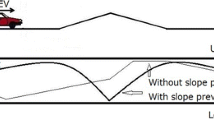Abstract
This paper presents a model predictive control approach for the energy management problem of a power-split hybrid electric vehicle system. The model predictive control is suggested to optimally share the road load between the engine and the battery. By analyzing the configuration of the power-split hybrid electric vehicle system, we developed a simplified model for better implementation of model predictive control. The model predictive control problem is solved using numerical computation method: continuation and generalized minimum residual method. Computer simulation results showed that the fuel economy was better using the model predictive control approach than the ADVISOR rule-based approach in three cases. We conclude that the model predictive control approach is effective for the application of power-split hybrid electric vehicle systems energy management and has the potential for real-time implementation. The simplified modeling method of the power-split hybrid electric vehicle system configuration can be applied to other configurations of hybrid electric vehicle.





Similar content being viewed by others
References
Serrao L (2009) A comparative analysis of energy management strategies for hybrid electric vehicles. PhD thesis, The Ohio State University, pp 12–43
Liu JM, Peng H (2008) Modeling and control of a power-split hybrid vehicle. IEEE Trans Control Syst Technol 16(6):1242–1251
Kim N, Cha SW, Peng H (2011) Optimal control of hybrid electric vehicles based on Pontryagin’s minimum principle. IEEE Trans Control Syst Technol 19(5):1279–1287
Borhan HA, Vahidi A, Phillips AM, Kuang ML et al (2009), Predictive energy management of a power-split hybrid electric vehicle. American Control Conference, St. Louis, MO, USA, June 10–12, 2009, pp 3970–3976
Deguchi Y, Kawabe T (2004) HEV charge/discharge control system based on navigation information.SAE, 2004-21-0028
Kamal MAS, Mukai M, Murata J et al (2010), On board eco-driving system for varying road-traffic environments using model predictive control. In: Proceeding of 2010 IEEE Multi-Conference on Systems and Control, Yokohama, Japan, Sep 8–10, 2010, pp 1636–1641
Kaku A, Kamal MAS, Mukai M et al Model predictive control for ecological vehicle synchronized driving varying aerodynamic drag and road shape information. Accepted in the IEEE Transactions on Intelligent Transportation System
Wipke K, Cuddy M, Burch S (1999) ADVISOR 2.1: a user-friendly advanced powertrain simulation using a combined backward/forward approach. IEEE Transact Vehicular Technol 48(6):1751–1761
Ehsani M, Gao Y, Emadi A (2009) Modern electric, hybrid electric, and fuel cell vehicles: fundamentals, theory, and design, 2nd edn. CRC press, Boca Raton, pp 138–144
Ohtsuka T (2004) A continuation/GMRES method for fast computation of nonlinear receding horizon control. Automatica 40(4):563–574
Author information
Authors and Affiliations
Corresponding author
About this article
Cite this article
Yu, K., Mukai, M. & Kawabe, T. Model predictive control of a power-split hybrid electric vehicle system. Artif Life Robotics 17, 221–226 (2012). https://doi.org/10.1007/s10015-012-0046-0
Received:
Accepted:
Published:
Issue Date:
DOI: https://doi.org/10.1007/s10015-012-0046-0



